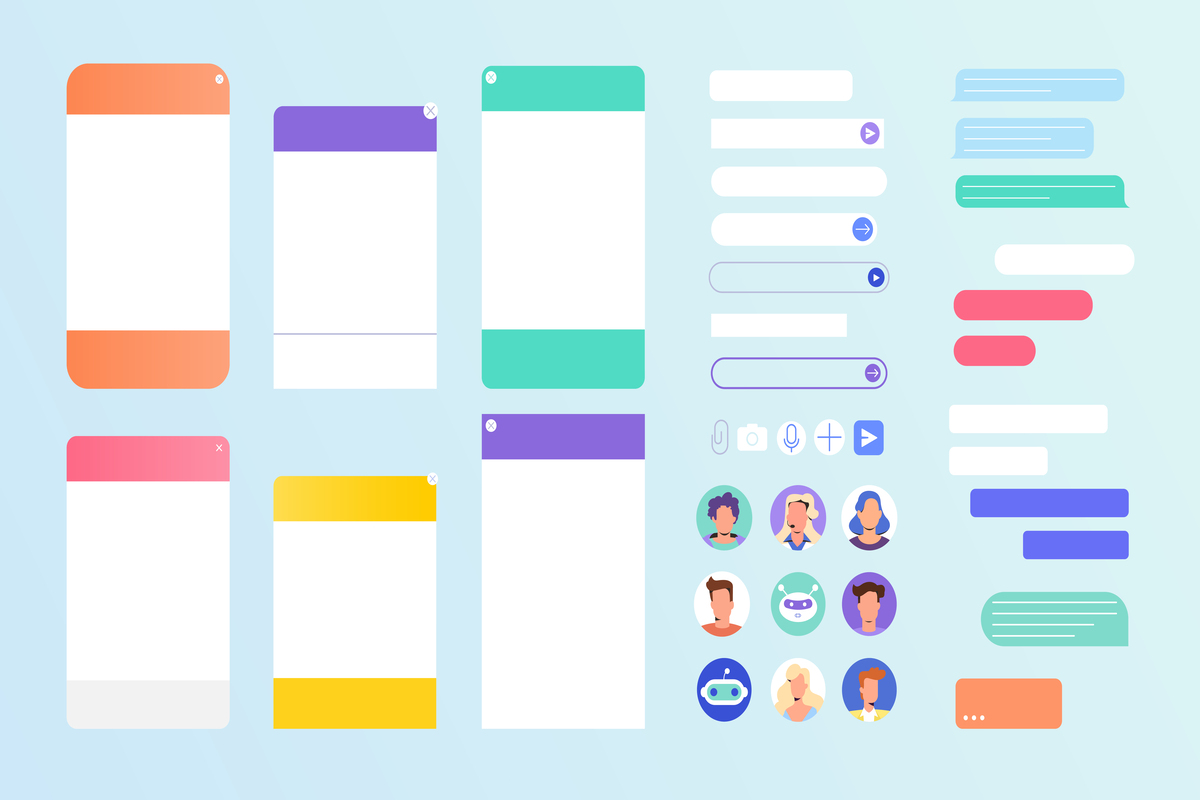Every website has a front end that contains details about the services users can access. Because it is the front end that users interact with, it must be readily available, exquisitely designed, user-friendly, and performant. User interface (UI) is another name for the front end. Websites all have some form of user interface. A back-end development area is separate from front-end development, focusing on the UI. Front-end teams are tasked to offer sound solutions that enhance productivity, user experience, client satisfaction, scalability, accessibility, and speed in an environment of fierce market competition.
The front-end development sector is expanding more quickly than the general economy. More companies are using these services to boost online visibility and increase client engagement. A visually appealing and simple-to-use interface will be developed for your website or application by the front-end development company you select. Additionally, they will make every effort to make it responsive and speedy on all devices and browsers. They employ a range of computer languages and instruments to achieve this, including HTML, CSS, and JavaScript.
To make websites more dynamic, front-end developers use animations and technologies. All interactions on a website must be implemented via code, from clicking a button to scrolling down.
Front-end development can address the issue of implementing accessibility best practices. The majority of users can easily access websites that are simple to make. Since they are the ones who write the code that all users engage with, front-end developers are the ideal candidates to advocate for accessibility best practices in product teams.
What Is The Most Important Thing For A Front-end Developer?
The front-end developer’s main duty is to ensure website users can readily interact with the page.
They do this by combining design, technology, and programming with coding a website’s appearance and taking care of debugging. To be proficient in coding languages such as HTML, CSS, JavaScript, and jQuery. Understand server-side CSS. Be experienced with graphic design applications (e.g., Adobe Illustrator). Understand the principles of SEO. The front-end developers are involved in the website’s layout and appearance. The back-end developers program the background functions, such as databases, concurrently.
If you visit any website, the navigation, layouts, and differences in how a site appears on your phone, all reflect the efforts of a front-end developer. Technical and soft skills are combined in the requirements for front-end developers. Back-end developers need the ability to think critically because they also construct systems and convert business logic into solutions. A user interface is similar to a wisecrack. If you have to interpret it, it could be better. You need to hire a front-end developer to create an excellent user interface for your applications.

What Skills Do Front-End Developers Need?
To complete the creation and deployment of mockups or wireframes, front-end developers collaborate closely with UX and UI designers. Skilled front-end developers can also make recommendations to change the structure and readily fix specific UX concerns.
The most important skills a front-end developer must have includes the following:
HTML/CSS:
The front-end development process is built on HTML and CSS, which are also the core competencies of front-end developers. The foundation of any web development process is HTML (HyperText Markup Language), a standard markup language used to generate web pages and apps. CSS (Cascading Style Sheets) is the language used in the presentation aspect of a site. With CSS, developers can give a website its unique look. HTML is used for creating the foundation for your page. At the same time, CSS is used to create the layout of the page, color, fonts, and style. Both of these languages are essential to become a front-end developer. These two dialects, closely related to the format style, are frequently easy to learn. The good news is that you can quickly discover whatever you ought to know.
JavaScript:
JavaScript is a lightweight programming language that interacts with Application Programming Interfaces (APIs). JavaScript, a dynamic scripting language, allows you to make websites interactive and build mobile apps. JavaScript ES6 gives your code new syntax and great functionality, modernizing and improving readability. You can accomplish more with fewer codes, thanks to it. This capability helps front-end developers create complex interactions quickly and simply on their websites, providing an ideal user experience.
If HTML and CSS control a web page’s presentation, JavaScript controls its function. This tech language implements interactive features such as video, audio, page animation, and games. JavaScript dominates the market with 62.5% of offers in the programming language space and is the most well-known and popular language among web developers. Websites like Pinterest make extensive use of JavaScript to make their user interface simple. In addition, it’s the most widely used programming language in the world, so learning it is beneficial regardless of your aspirations for a career as a developer.
Some other skills a front-end developer should have familiar with are:
jQuery:
jQuery is a JavaScript library. It is a collection of plugins and extensions that make it faster and easier to use JS on a website. Common tasks that call for several lines of JS code are condensed by jQuery into a format that can execute with just one line. Front-end web developers can add pre-made elements to projects using jQuery and customize them as necessary (one reason why knowing JavaScript is so important). In many ways, it makes JavaScript web page building simple. Instead of coding everything from scratch, jQuery enables you to add pre-built components to projects and customize them as needed. Timer functions, search autocompletes, and even updating and resizing matrix formats may all be done with jQuery.
CSS Preprocessors:
To start your career as a front-end developer, you must know about CSS preprocessors. With the preprocessors, CSS is complete. CSS Preprocessor is a more complex variation of CSS. It is used to enhance the primary CSS class to enhance website versions. It is not just a language to improve the styling elements, but it helps the developers to skip tasks like writing CSS selectors and color strings frequently. It’s yet another way to simplify your life. Developers can write code in the preprocessor’s language using CSS preprocessors like SASS, LESS, and Stylus. It transforms your code into well-formatted, cross-browser-compatible CSS before you publish it to your website.
Problem-Solving:
Problem-solving isn’t a technical skill like HTML, CSS, JavaScript, or their many implementations and libraries — but it is essential to front-end development nonetheless. Being good at solving non-developer problems often means you’re also good at solving code problems. The skills mentioned above are for a career, but the foundations of front-end development are much more universal: endless curiosity, a willingness to experiment, and critical thinking. It’s possible to imagine today’s world with the web, which indicates how vital front-end developers are to the business and social worlds. Front-end developers interact with others every day — from shopping on Amazon to catching up with friends on Facebook, Twitter, or Instagram.

How To Hire A Front-end Developer?
A user interface is similar to a wisecrack. If you have to interpret it, it could be better. You need to hire a front-end developer to create an excellent user interface for your applications. Finding such front-end developers takes work; it’s always hard to retain them for a long time when you find one.
Freelance Marketplaces:
Remember that your developer is optional to devote full attention to your project because they are freelancers. Hiring a freelancer is the least expensive option compared to other choices. Freelance developers can work on several projects at once and are free to do so. The development process will likely be slower, and the end product will contain more bugs.
However, the more freelancers you hire, the more communication and problems appear. Online markets for freelancers include places like UpWork and Fiverr. It is up to the independent front-end developers who work on these sites to promote their qualifications. You get to decide who you think is best. It might be a pro or a con depending on the level of commitment you seek. You shouldn’t hire someone full-time if you require a temporary resource for front-end development.
Pros of hiring a freelancer:
- The relatively low cost of hiring a freelancer is an appealing perk. It occurs as a result of the intense rivalry on freelance marketplaces.
- Another advantage is that you can recruit independent contractors only as needed. You won’t have to worry about taking time off for illness or vacation.
This choice is fantastic if you have a short project or a light workload.
Cons of hiring a freelancer:
- Freelancers’ major flaw is their dependability. They often live in different time zones, so it might be challenging to control their timetable.
- Additionally, having additional security against freelancers quitting your project without saying a word would be beneficial. It is every project owner’s worst fear.
In-house Developers:
As a decision-maker, you know the difference in working effectiveness between loyal and unloyal employees. Unlike freelancers, in-house developers are directly interested in positive project results and less likely to leave.
Pros of hiring In-house Developers:
- Developers can be encouraged to care about their long-term objectives and vision by receiving increasing monthly compensation and working in a consistent, well-equipped environment.
- They are more likely to put in more time and develop into effective team members.
Cons of hiring In-house Developers:
- It costs money to pay developers their regular, rising wages.
- Finding a decent developer can be challenging, particularly if you live in a small city. In addition, you need to think about things like taxes, software, gear, and office space.
- Finding, interviewing, and on boarding in-house developers takes a decent amount of time.
- Additionally, because programmers tend to quit their employers more frequently than other specialists, this process constantly repeats itself.
Outsourced Developers:
Outsourcing agencies provide small and medium-sized businesses with the team they need to commit to software development while saving you the work. These agencies are worldwide with developers on hand to build your project from the ground up. Decision-makers began to frequently hire IT outsourcing services as a hiring choice quite quickly. In an offshore software development company, you can recruit front-end developers from any nation you choose. Additionally, they work remotely from their business office on your assignment. You avoid paying office rent, sick days, vacations, taxes, etc.
Pros of hiring Outsourced Developers:
- The costs mentioned above don’t require you to spend additional funds.
- Additionally, outsourcing enables you to scale up or down your development staff as needed.
- It’s crucial to understand that the outsourcing team functions as a unit and not as a collection of independent contractors who have never interacted with one another.
Cons of hiring Outsourced Developers:
- Comparing the pricing to freelancers reveals a little increase.
- Since outsourced developers are frequently based abroad, a time zone problem could arise.
Many small to medium-sized businesses (SMBs) still need to get what’s necessary to manage a remote and an in-house team. It can be difficult for the agency involved to know the specific vision of your project, so advocating your desires is key.
How Much Does A Front-end Developer Get Paid?
It’s exciting to embark on a career change to become a front-end developer. You’re gaining knowledge, networking, and progressing in your quest for personal and professional fulfillment. The good news is that front-end developers in the US can anticipate an average compensation of six figures, just like many other development-related occupations.
Average front-end developer salary, according to Glassdoor. According to Glassdoor, the average front-end developer salary is $86,013.
That amount is based on the 3,715 salaries submitted by front-end developers to Glassdoor. The lowest front-end developer salary is around $51K, while the highest is $145K.
With an average salary of $89,948 per year, a career in front-end development is a viable choice. The pay is equal to similar professions, so money should be easy.
Where you live and the skills under your belt can impact your salary, so expanding your knowledge and moving to a different location can increase your yearly income.
Final Thoughts:
The specific talents a front-end developer is expected to have are highly dependent on the project and its requirements. However, if you want a head start in front-end development, you’ll need the skills we outlined earlier. The market has a huge need, and since there is a growing shortage of skilled developers, likely, the gap will not be closed any time soon. Now that you’ve learned almost every step of hiring a front-end developer – from basic definitions to skill sets to costs and markets – you might have a better idea of your business needs.



